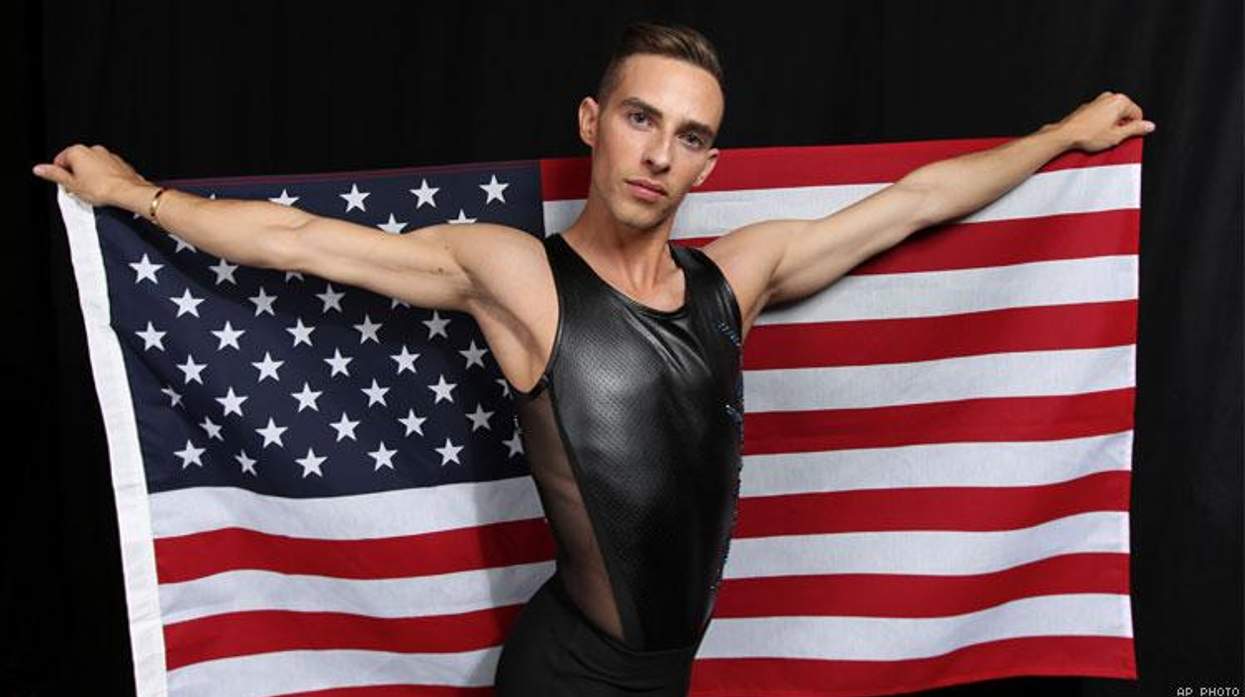Adam Rippon spent his whole life dreaming of a chance to skate at the Olympics, but he never expected making Team USA to lead to a public feud with the White House. "To have the press secretary of the vice president call me out and try to call me a liar was a little bit shocking," he says. "That wasn't something I was expecting, but I was prepared."
The schism happened after Rippon told USA Today he didn't agree with Vice President Mike Pence leading the Olympic delegation in South Korea next month because the politician supported public funding for so-called gay conversion therapy. Pence press secretary Alyssa Farah issued a statement saying the accusation was "totally false and has no basis in fact," but as The Advocate has reported, it does have some basis.
"I didn't make these statements up," Rippon says. "They aren't false allegations. They are true facts and statements you can find on an archived website of his."
Heading into the Games, Rippon won't back down from controversy. He's got a platform for the moment and will use it. Indeed, it's a decision he made three years ago to no longer shy away from his own truth in public that helped him become one of the best skaters in America.
Rippon came out as gay to Skating magazine in 2015. Looking back, that unburdening led to results on the ice as well. "The same season I came out, I became national champion," he recalls.
And with his selection to the Olympic team heading to PyeongChang in February, he's now realized a goal in his sights since he first strapped on a pair of figure skates.
Rippon is believed to be the first openly gay man selected for a Winter Olympics team by any nation, but it's also exciting for him to see freestyle skier Gus Kenworthy, who also came out in 2015, make the U.S. team, as well. That America will send at least two out Olympians reflects an important evolution in society, he says. That's also critical because the makeup of Team USA will deliver a snapshot of American life to all the world.
"I skate with Nathan Chen everyday. He is an 18-year-old Chinese-American from parents who emigrated here," Rippon says. "Nathan Chen and me, a 28-year-old gay man from Scranton, Pa., these are the new faces of America. It's important people from all sports show who they are and where they came from because that's what makes being from Team USA so awesome. Everybody has a different story."
Yet no matter the background, they all share a unifying passion for sports. "The one thing we all have in common is that we all had this goal of being Olympians and going to the Games," he says. "We celebrate that by going out and demonstrating our abilities to the best that we can."
So how can it take until the 2018 Games for an openly gay man to take the ice? After all, figure skating has seen more athletes come out after the close of their competitive career than any other Winter Olympics sport. Rippon believes that has something to do, ironically, with the stereotype of all skaters being feminine in the first place. When he came out, he says, "it was still taboo to come out while you were competitive. People felt maybe the judges would not push somebody who was openly gay. I thought all of it was kind of silly."
But he knows other children teased him as a child for pursuing figure skating. He got through that with his mother's encouragement; she told him then he should pity bullies since he could do something he loved every day. But he also suspects that type of abuse pushed too many kids away from the sport altogether, and those who stuck around didn't want to be branded as gay.
"I remember being young in the mid to late '90s, and being somewhere and people were talking about equality," he says. "Then I remember turning and hearing someone say 'Ugh, gay people are just so disgusting.' I took that with me for a really long time." He figured at that point his sexuality would be a secret he had to guard his entire life.
And it's not like the stigma has disappeared. Still outspoken, he notes the law hasn't caught up with society even now. "There's still laws that say you can discriminate against an LGBT person because it's 'against your religion.' Still, you don't have complete freedoms in some places," he says.
That's why he won't settle for Americans tolerating him. He wants the nation's unabashed embrace. "I don't want people to say we like Adam and we're OK with his lifestyle choice," he says. "A lifestyle choice is buying a jacket or having a fun pair of shoes. That's a choice, but being gay is part of who I am."




































































Charlie Kirk DID say stoning gay people was the 'perfect law' — and these other heinous quotes